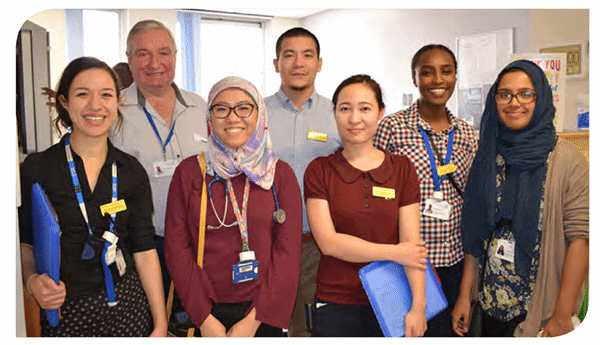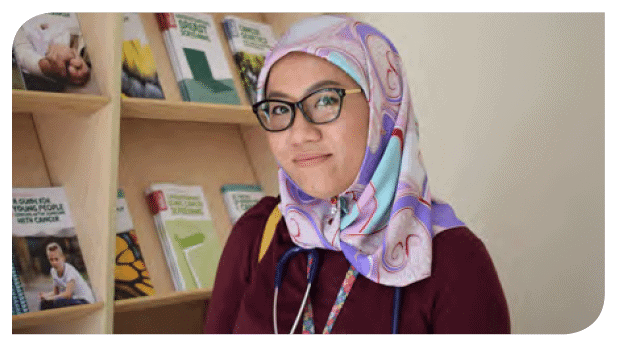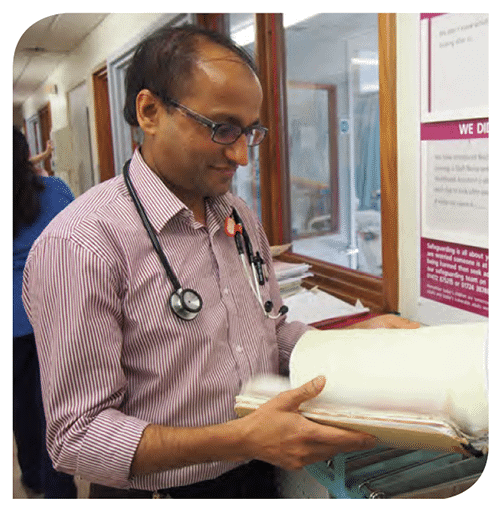OVERSEAS MEDICAL RECRUITMENT
THE LANGUAGE OF
MEDICINE IS UNIVERSAL

Are you looking for an opportunity to work in the UK as a doctor?
We welcome your knowledge and experience at Northern Lincolnshire and Goole NHS FT. Our multicultural hospital Trust has extensive experience in working with, supporting and developing international doctors. We value international experience that enriches our medical capabilities and broadens our patient experience. To find out more about our Hospital Trust please click here.
As well as being an “A rated” immigration sponsor, we have a dedicated onboarding team that will guide you through the process of applying to work in the UK and who will support you through every step of the recruitment process.
Once you are ready to travel our team will support you with all of the arrangements. We’ll help you settle by assisting with your accommodation, helping you set up a UK bank account, introduce you to the local area and introduce you to the team you’ll be working with. We’ll also give you a generous relocation allowance of up to £4000 pro rata to assist with the financial side of relocating.
The Trust is set on the east coast of England benefiting from excellent coastal attractions and the beautiful Lincolnshire Wolds. We are in close proximity to a number of major northern cities – with excellent travel links to the rest of the UK. For more information on living, working and experiencing Northern Lincolnshire and the East Riding of Yorkshire please click here.
To express your interest and send a copy of your CV, please email nlg-tr.wearerecruiting@nhs.net
The following guide has been prepared to simplify the requirements of working in the UK as a Doctor.
 To work in the UK as a doctor there are a few requirements needed from both a visa and medical perspective. These include:
To work in the UK as a doctor there are a few requirements needed from both a visa and medical perspective. These include:
- Language Testing (Either IELTS or the OET)
- Professional and Linguistic Assessments Board (PLAB)
- General Medical Council (GMC) Registration
- Applying for a Visa
We also offer information for applicants applying through the following initiatives:
- Medical Training Initiative (MTI) Scheme
- Certificate of Eligibility for Specialist Registration (CESR)
LANGUAGE TESTING
Within the UK, evidence of acceptable English language skills is a requirement for applicants and international graduates seeking professional registration. There are three types of language tests.
You must pass one of the following English language tests:
The International English Language Testing System (IELTS)
or
The Occupational English Tests (OET)
As well as the:
Professional and Linguistic Assessments Board (PLAB).
We’ll provide information about each test below.
The International English Language Testing System (IELTS)
The International English Language Testing System (IELTS) measures the language proficiency of people who want to study or work where English is used as a language of communication. It uses a nine-band scale to clearly identify levels of proficiency, from non-user (band score 1) through to expert (band score 9).
IELTS test scores remain valid for two years. There is no limit to the number of times candidates can sit the IELTS exam but the required scores must be obtained in a single sitting.
The test consists of four sections:
- Speaking
- Listening
- Writing
- Reading.
A score of 7.5 is required in order to work within the NHS on the academic test – not the general version. A minimum score of 7.0 must be achieved in each section.
The test can be taken in a number of locations worldwide, for more information please visit:
Occupational English Test (OET)
The Occupational English Test is a newer alternative to the IELTS.
The test is more focused on healthcare language and scenarios than the more general english language question in the IELTS.
Like the IELTS, the OET tests against the same 4 sections:
- Speaking
- Listening
- Writing
- Reading.
Candidates must score at least a ‘B’ in each section.
For more information please visit the Occupational English Test’s website here:
www.occupationalenglishtest.org
Professional and Linguistic Assessments Board (PLAB)
The PLAB test is the main route by which international medical graduates (IMGs) demonstrate that they have the necessary skills and knowledge to practise medicine in the UK.
The PLAB test assesses your basic medical competence and your ability to communicate in English for suitability to work at Foundation House Officer 2 level (FHO2), although doctors at FHO1 level can take it.
Do you need to take the PLAB test?
You will need to pass the PLAB test before you can apply for registration with a licence to practise if you meet the following criteria:
You are a national of a country outside the UK, European Economic Area (EEA) or Switzerland who graduated from a medical school outside the UK OR you are a UK national who has graduated from a medical school outside the UK, EEA or Switzerland
AND
You do not have an Enforceable Community Right (EC Rights)
AND
You do not have one of the following:
- A sponsorship under an arrangement approved by the GMC
- An approved postgraduate qualification
- Eligibility to enter the GP or specialist register
There are two parts to the PLAB test:
Part 1 of the PLAB test consists of a three hour computer-marked written examination, comprising extended matching questions and single best answer questions. The examination tests four skill areas: diagnosis, investigation, management/treatment and context of clinical practice.
Part 2 is the Objective Structured Clinical Examination (OSCE), which assesses clinical examination, practical skills, communication skills and history taking in a number of controlled situations.
How do you apply for a PLAB test?
All applications for PLAB exams must be made online through the GMC website:
If you are unable to apply online you should contact the GMC for an application form.
Telephone: +44 (0)161 923 6602
General Medical Council (GMC) Registration
 All doctors intending to practise medicine in the UK are required to be registered with the GMC.
All doctors intending to practise medicine in the UK are required to be registered with the GMC.
Doctors who have never been registered with the GMC will have to apply for registration with a licence to practise.
The requirements for registration in the UK will depend on a number of factors:
- Your nationality
- The country in which you gained your primary medical qualification
- The type of work you want to do
- Whether or not you have completed a period of post-graduate training or an internship.
First you should check that you possess an acceptable primary medical qualification to apply for registration. If you are in any doubt you should check your qualifications status with the GMC.
As part of the process an identification check will take place in the UK. There are four types of registration, as follows:
- Provisional Registration
- Full Registration
- Specialist Registration
- General Practice Registration.
More information about GMC registration is available on the GMC website at:
www.gmc-uk.org
Telephone: +44 161 923 6602
Applying for a Visa
UK immigration uses a points -based system for managing applications by individuals from outside the European Economic Area (EEA) and Switzerland wishing to work, train or study in the UK. This system simplifies routes to employment and education in the UK to five tiers.
If you come from outside the EEA, you need to gain points to qualify for a specific tier before you can apply to work in the UK. The number of points required varies for each tier but reflect the applicants’ qualifications, experience, age, previous earnings and language competence.
Trust grade Junior doctors would need to apply for a visa under tier 2. Tier 2 is for skilled workers. This category enables NHS organisations to recruit individuals from outside the EEA to fill vacancies that cannot be filled by a British or EEA worker.
You can apply for a Tier 2 (General) visa if:
- You’ve been offered a skilled job in the UK
- You’re from outside the European Economic Area (EEA) and Switzerland
Getting Sponsored
You need to be employed by a licensed sponsor to apply to live in the UK.
Your sponsor checks that you can do the job they’re hiring you for and if it qualifies you for a visa. They’ll assign you a certificate of sponsorship to prove this. Northern Lincolnshire and Goole NHS Foundation Trust is a licensed sponsor and will be able assist you with your application.
How long it will take
You can apply for a visa up to 3 months before the day you’re due to start work in the UK. This date is listed on your certificate of sponsorship.
You should get a decision on your visa within 3 weeks when you apply from outside the UK.
Fees
How much you pay for a Tier 2 (General) visa depends on your situation, where you are and how you apply.
For more information on the fees that apply, your eligibility and the documents you must provide please visit the UK’s Visa and Immigration website at: https://www.gov.uk/browse/visas-immigration
Medical Training Initiative (MTI) Scheme
The International Sponsorship Scheme (ISS) is designed to support international medical graduates (IMGs), through facilitation of General Medical Council (GMC) registration, who come to the UK to engage in training opportunities and who return to their home countries to implement their training and experience in the development of local health services. Northern Lincolnshire and Goole NHS FT work with approved Royal College ISS sponsors to support successful candidates at every stage through the recruitment process.
We have posts available within Northern Lincolnshire & Goole NHS Foundation Trust, that have an emphasis on training and education and will allow you to receive a balanced mixture of training and service that will in all respects mirror those of the existing doctors in training. You will be encouraged, supported and guided through the preparation and delivery of some relevant teaching at an appropriate forum. You will be allocated a named Educational Supervisor in your post who will review and support your educational needs.
The MTI scheme allows international doctors to spend up to 24 months in the UK training alongside their UK counterparts with the aim of sharing their learning on return to their home countries.
To assess whether you are eligible to join the MTI scheme, all applicants should find the following as essential critical for the post:
- Engagement in clinical practice/training for 3+ years since obtaining a primary medical qualification.
- Minimum overall score of 7.5 in the International English Language Testing System (IELTS) – or hold a recognised exempting qualification.
- Obtained a postgraduate qualification equivalent to the level of the MRCP/MRCS (UK) within the last 5 years or have passed MRCP Part 1 within the last 2 years.
Certificate of Eligibility for Specialist Registration (CESR)
 The Certificate of Eligibility for Specialist Registration is a route to entry onto the Specialist Register for those doctors who have not followed or completed an approved training programme. It was previously known as article 14.
The Certificate of Eligibility for Specialist Registration is a route to entry onto the Specialist Register for those doctors who have not followed or completed an approved training programme. It was previously known as article 14.
The Specialist Register is a list of doctors who are legally entitled to take up honorary, substantive or fixed term consultant posts in the NHS and is maintained by the General Medical Council (GMC).
Hospital doctors are included onto the Specialist Register after they have been awarded either a Certificate of Completion of Training (CCT) or a Certification of Eligibility for Specialist Registration (CESR).
Doctors who wish to join the specialist register who have not followed a full approved GMC training programme but who may have gained the same level of skills and knowledge as CCT holders, can apply for a CESR.
You’ll be fully supported throughout the application process at Northern Lincolnshire & Goole NHS Foundation Trust if you decide to apply for CESR. Your current experience will be assessed against the CESR requirements for your specialty and we’ll work with you and other departments to facilitate placements for you to gain the necessary clinical experience required for a successful application – both within your own specialty and other specialties as required. You will have clinical and education supervisors available for advice and regular appraisals to track your progress, and access to a mentor who has undergone CESR themselves and has first-hand experience of the process for assistance in completing your application.
If your CESR application is successful, you will be awarded the certificate and entered onto the Specialist Register, and will be eligible to further your career by working in the UK at a senior level as an honorary, substantive, or fixed term Consultant.








